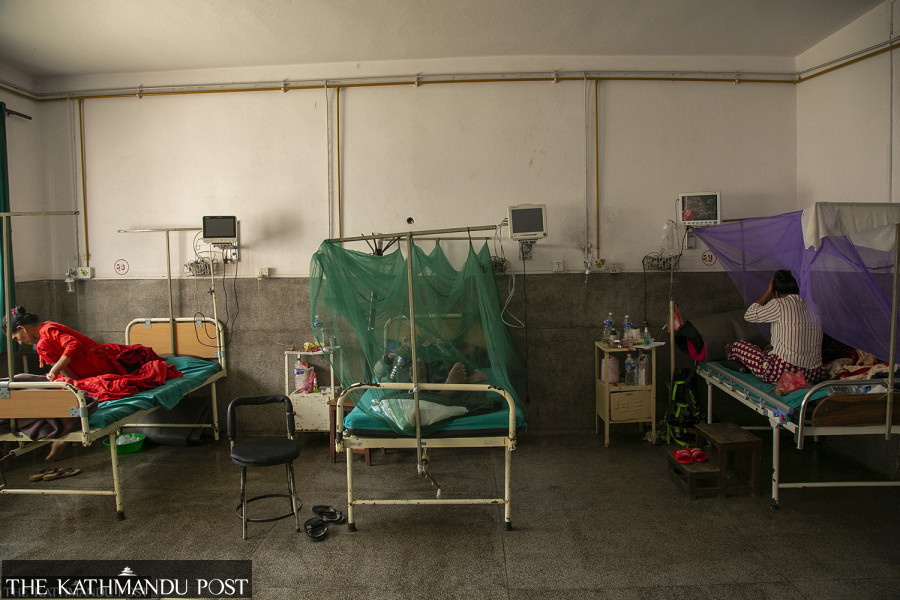Health
2,700 dengue and 432 Covid cases recorded since January
Health officials warn dengue has spread to 74 districts and cases could rise after monsoon.
Post Report
The Epidemiology and Disease Control Division said that 2,720 people have been infected with the dengue virus since January, which has been spread in 74 districts across the country.
The number of people infected with the virus in the past one week reached 160, and the reported cases could be just the tip of the iceberg, as 90 percent of the cases remain asymptomatic, according to doctors.
Many people infected with dengue show mild symptoms, which do not need any treatment or can be managed with paracetamol at home.
“Four patients infected with the dengue virus have been receiving care in our hospital,” said Dr Yuba Nidhi Basaula, director at the Sukraraj Tropical and Infectious Disease Hospital. “The number of dengue-infected patients could rise in the coming days as dengue surges mostly happen in the post-monsoon period.”
Dengue is a viral disease transmitted by female Aedes aegypti and Aedes albopictus mosquitoes. According to the World Health Organisation, the same vector also transmits chikungunya, yellow fever, and the Zika virus.
In 2024, 15 people died, and 41,865 others were infected as the virus spread to 76 districts. In 2023, 88 persons succumbed and more than 54,000 were infected by the virus, which had spread to all 77 districts.
At the time, hospitals in Kathmandu Valley were overwhelmed with dengue patients, and pharmacies had run out of paracetamol, the most widely used medicine to treat fever.
Since dengue became endemic in Nepal years ago, meaning people get infected throughout the year, health officials no longer classify it as an outbreak of a deadly virus.
The Ministry of Health and Population declared a month-long campaign against dengue virus on July 17. Officials hope that the campaign will be owned by all agencies concerned and local units throughout the country and that activities will be carried out accordingly.
The health ministry has estimated that in a worst-case scenario, up to 60,000 people across the country could get infected with the dengue virus this year.
Entomologists say that, along with launching a search-and-destroy drive on a regular basis, authorities should also focus on a multisectoral approach, community engagement, door-to-door campaign, and strengthening the capacity of health facilities to handle possible outbreaks.
Experts also suggest regular monitoring of construction sectors, houses and offices to check if larvae of dengue mosquitoes are thriving in such places.
Dengue-transmitting mosquitoes breed in clean water and bite people in daylight. Uncovered water tanks and discarded objects such as plastic cups and bottles could be breeding grounds for dengue-carrying mosquitoes.
According to doctors, symptoms of dengue include mild to high fever, severe muscle pain, rashes, acute headache and pain behind the eyes. Doctors advise those with these symptoms to seek immediate treatment. While there is no specific cure for the disease, early detection and access to proper medical care can lower fatalities.
Nepal reported its first dengue case in a foreigner in 2004 in Chitwan district. Since then, an increasing number of dengue infections, including major outbreaks, have been reported from many districts.
The World Health Organisation says there is no specific cure for severe dengue, but early detection and access to proper medical care can save lives.
Meanwhile, the Epidemiology and Disease Control Division said that three people died and 432 people tested positive for Covid since January. The number of districts reporting coronavirus infections reached 49.




 25.96°C Kathmandu
25.96°C Kathmandu














